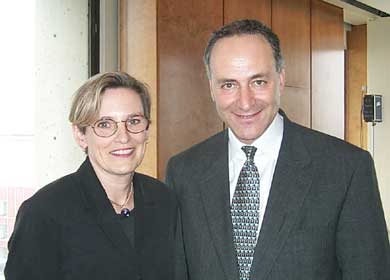
|
|
Senator Charles Schumer, right, with Dean Lisa Anderson of the School of International and Public Affairs on April 18.
|
The U.S government and private industry must step up efforts to combat the threat of cyberspace attacks on the nation's key infrastructures such as power grids, telecommunications, transportation, and financial systems, according to U.S. Senator Charles E. Schumer, D-N.Y., who spoke at the School of International and Public Affairs at the invitation of Dean Lisa Anderson on Tuesday, April 18.
Senator Schumer told about 75 faculty, students and guests that the country is ill-prepared to defend against the kind of "cyber-terror capabilities that could cripple the U.S. economy and bring U.S. cities to their knees," including attempts to sabotage and disrupt the financial system, air traffic control network and other critical services that form the backbone of the economy.
"The fact is, although the United States is far and away the most technologically advanced nation on earth, we are also far and away the most technologically vulnerable," said Schumer, who cited several recent hacking cases, including disruptions in major Internet-based services such as Yahoo! and Amazon.com and the discovery by hackers of critical phone numbers needed to shut down the U.S. electrical grid.
Schumer said the nation is "mired in a Cold War-era defense spending mentality" that has left it vulnerable to cyber-terrorism, which he called "the real threat of the 21st Century." Noting that defense spending totals $290 billion, while expenditures on cyber-security and critical infrastructure protection are only $1.4 billion, Schumer said: "This glaring mismatch between vulnerability and threat on the one hand, and resource allocation on the other, has created an absurd situation in which the U.S. has become virtually invulnerable at the conventional military level, but dangerously vulnerable against 'asymmetric threats' -- against which we currently have no viable protection."
He said government should play a major role in bringing industry together to combat the risk and providing incentives, such as tax relief to industry to develop cutting-edge cyber-security systems.
Schumer has co-sponsored legislation with Senator Orrin Hatch, R-Utah, that would establish a National Cyber-Crime Technical Support Center and 10 regional computer forensic labs to prevent and investigate cyber-crime. The bill also would establish a Deputy Attorney General for Computer Crime to coordinate prevention and prosecution.
But more needs to be done, said Schumer, including increased spending for the Defense Advanced Research Projects Agency -- developer of the Internet -- to become the point agency for developing safeguards against new-technology threats, and the convening of international summits to bring international law and treaties into the cyber-age. "Over 55 percent of cyber-attacks originate from foreign sources," said Schumer, "And our laws are so behind the times the best way to prosecute international cyber criminals is through the use of antiquated maritime laws."
|
